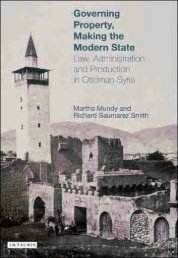The Young Turk Period, 1908-1918 - PSI424
The Young Turk Period, 1908-1918 - PSI424
The Young Turk Period, 1908-1918 - PSI424
Create successful ePaper yourself
Turn your PDF publications into a flip-book with our unique Google optimized e-Paper software.
310 <strong>The</strong> Rise of Modern <strong>Turk</strong>ey, 1808-1975<br />
bureaucracy by Abdulhamit. <strong>The</strong> use of <strong>Turk</strong>ish as the primary language of business<br />
in the foreign and minority commercial establishments and schools was encouraged.<br />
With the religious schools and courts coming under governmental control,<br />
<strong>Turk</strong>ish rather than Arabic predominated.<br />
As it was developed during the CUP period and came to be applied under the<br />
Republic, <strong>Turk</strong>ish nationalism was mainly a constructive rather than a destructive<br />
force, seeking to convince its adherents to build their society and nation by their<br />
own efforts, aiming only to eliminate those elements of discrimination that kept<br />
them from doing so, and inviting all those ethnic groups that were not <strong>Turk</strong>ish to<br />
accept the new nationality and to join in the struggle to build a new nation in<br />
place of the declining empire. This was not to be, however. As the <strong>Turk</strong>s were<br />
beginning to seek their own national identity, the bases of Islamic unity in the<br />
empire were torn apart, and the Arab national movement developed to the extent<br />
that it facilitated the disintegration of the empire soon after the war began.<br />
<strong>The</strong> Ottoman Empire Enters the War<br />
Ottoman involvement in World War I, and on the side of the Central Powers,<br />
certainly was not inevitable. Despite the newly emerging patriotic fervor, most<br />
members of the cabinet and the CUP and many <strong>Turk</strong>ish people realized that the<br />
empire was hardly in a state to support any major military effort so soon after the<br />
series of wars that had decimated its population and finances as well as its armed<br />
forces. Although Germany had been building up the army, it did not really expect<br />
the Porte to be able to make a significant military contribution even if it did decide<br />
to join the Central Powers. Modernization had only begun. Besides, most members<br />
of the CUP and the mass of the public still felt closer to Britain and France than<br />
to Germany. German autocracy and militarism appealed only to Enver and those<br />
officers who had received some training in Germany, but they hardly dominated<br />
Ottoman politics at the time, and whatever influence they had seemed to be<br />
countered fully by that of Cemal and the navy, which favored the Triple Entente,<br />
or even better, neutrality.<br />
Behind the scenes, however, Enver was skillfully paving the way for an alliance<br />
with Germany. His argument was simple. If war came, Russia would most certainly<br />
attempt to extend its gains at Ottoman expense, particularly in the east, where it<br />
continued to foment Armenian terrorism and agitation. With Russia on the Entente<br />
side it would be difficult to secure protection from England and France. On the<br />
other hand, Germany had no territorial ambitions in the Middle East; its own<br />
strategic interests required limitation of further Russian expansion. While its<br />
Austrian ally long had coveted Ottoman territory, its acquisition of Bosnia and<br />
Herzegovina had increased its minority problems to such an extent that it hardly<br />
would be anxious to add further Slavic territories to its domains. Cemal actually<br />
made some approaches to the Entente early in 1914 to counter Enver's efforts, but<br />
Britain and France brusquely rejected the offer. Germany, on the other hand, alone<br />
among the major powers, seemed willing to join the Ottomans in open alliance.<br />
Since there remained so much popular opposition to an attachment with Germany,<br />
however, the negotiations were conducted secretly with only the grand vezir and<br />
foreign minister, Sait Halim, and Enver initially involved. <strong>The</strong> actual alliance<br />
treaty was signed only on August 2, 1914, after the war had already begun in<br />
Europe. It provided for Ottoman intervention in support of the Central Powers only<br />
if Germany's assistance to Austria in the Serbian crisis (Austria had declared war












